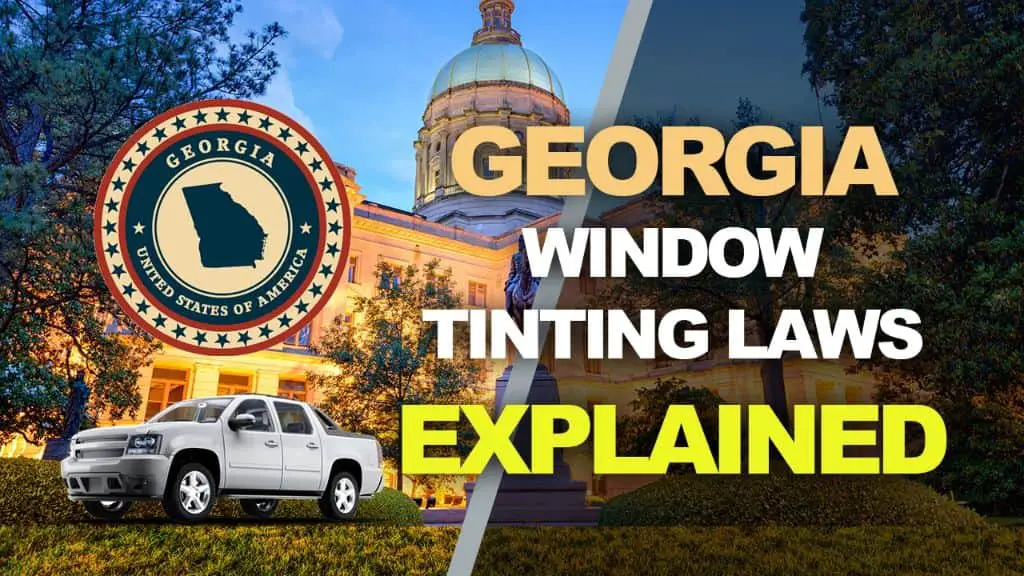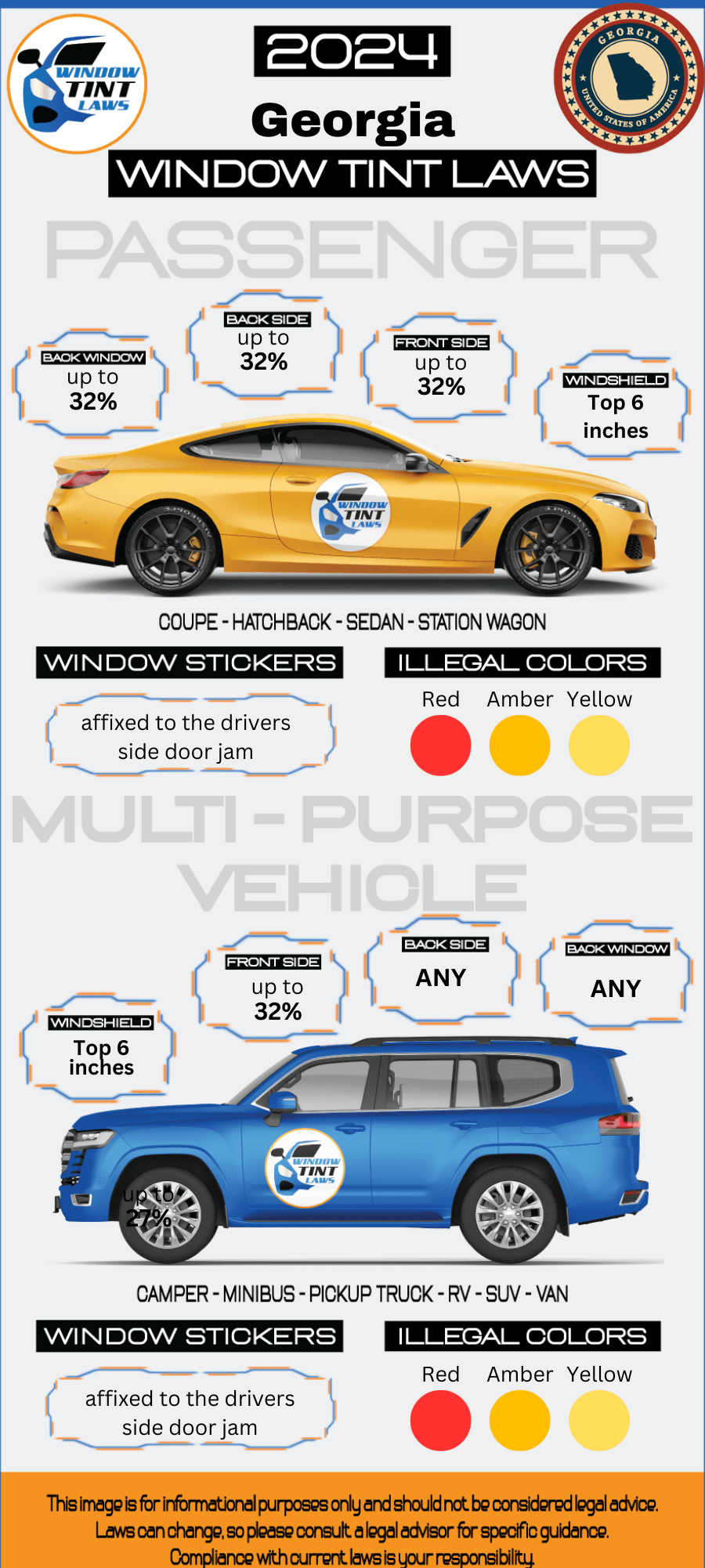

Article Created by Ryan Pietrzak
Last updated on February 5, 2024Georgia Tint Laws – 2024 Updated Legal Tint Limit
Please note that Georgia Tint Laws Regulation can change daily and may be interpreted differently at the city or county level. We recommend verifying this information with your local DMV or law enforcement agencies. We have manually fact-checked this content using official state resources. Georgia enacted tinting laws in 2005. If any information provided is incorrect or outdated, please contact us so we can make the necessary corrections. Thank you.
2024 Georgia Tint Laws – Legal Tint Limit For Passenger Vehicles
- Front Windshield: Non-reflective tint is allowed on the top 6 inches of the windshield. The front windshield can only have a tint strip at the very top, allowing full light transmission otherwise.
- Front seat side windows: up to 32% tint darkness allowed. Front side windows must allow over 32% light transmission, limiting tint darkness to 32% or lighter.
- Back seat side windows: up to 32% tint darkness allowed
- Rear window: up to 32% tint darkness allowed
2024 Georgia Tint Laws – Legal Tint Limit For Multi-Purpose Vehicles
- Front Windshield: Non-reflective tint is allowed on the top 6 inches of the windshield.
- Front seat side windows: up to 32% tint darkness allowed
- Back seat side windows: Any tint darkness can be used
- Rear window: Any tint darkness can be used

- Medical exemptions: Georgia tint laws permit darker tints on front side windows with a doctor’s note
- Georgia tint law prohibit metallic or reflective tint on any of the windows
- Georgia tint laws are statewide with no additional local regulations
- Violating Georgia tint law can result in a fine up to $150 upon first offense.
What does VLT Mean according to Georgia Tint Laws?
- Window tint film’s light transmission is measured as VLT (Visible Light Transmission) and each state has its own legal limits for VLT on car windows.
- A HIGHER VLT means that more light is allowed to pass through the window tint film.
- Example: a 75% tint will allow 75% of the light to pass through whereas a 5% tint will only allow 5% of the light to pass through, making the 5% tint a much darker film.
- Georgia window tint laws has specific VLT limits for Passenger Vehicles and Multi-Purpose Vehicles.
FAQ’s Regarding Georgia Tint Laws and Georgia Legal Tint Limit
What is the darkest legal tint in Georgia?
In Georgia, the darkest legal tint for passenger vehicles is 32% VLT (Visible Light Transmission) for all side and rear windows. This means the tint must allow at least 32% of the light to pass through.
Are police exempt from window tint laws in Georgia?
Yes, in Georgia, police vehicles are generally exempt from the state’s window tint laws. This allows law enforcement vehicles to use window tint that is darker than the legal limit prescribed for regular passenger vehicles.
How do I get a tint waiver in Georgia?
In Georgia, to obtain a window tint waiver for medical reasons, you must submit a completed Application for Exemption to Window Tint Law form, which includes a physician’s certification stating the medical necessity for darker tint. This application must be submitted to the Georgia Department of Public Safety for approval.
How much is a tint ticket in Georgia?
In Georgia, the cost of a ticket for a window tint violation is typically $25 for a first offense. However, repeat offenses or non-compliance may result in higher fines.
Can you get pulled over for tint in Georgia?
Yes, in Georgia, you can be pulled over by law enforcement if your vehicle’s window tint is suspected to be darker than the state’s legal limit. This could lead to a ticket or a requirement to remove the non-compliant tint.
How to get a Tint Exemption in Georgia
Official Code of Georgia Annotated (OCGA) Section 40-8-73.1 prohibits the use of tinted windows with certain exceptions. One exception allows persons with a
restrictive medical condition to operate or ride in a vehicle with tinted windows.
When approved by the Department of Public Safety, the approval copy of this completed document serves as authorization for an exemption to the window tint law
based on a restrictive medical condition. Each application must have an attestation from a person licensed to practice medicine under Chapter 34 of Title 43 or a
person certified as an optometrist under Chapter 30 of Title 43.
A $10 fee per application/household is required. All funds must be paid by either money order, certified check, or cashier’s check. No personal checks will be
accepted. Return this form along with the required fee to the Department of Public Safety, Attention: Accounts Receivable, P.O. Box 1456, Atlanta,
GA 30371-2303. For any questions concerning this permit, please call (404)624-7523.
APPLICANT INFORMA
(1) Any person requesting an exemption from O.C.G.A. Section 40-8-73.1 who is required for medical reasons to be shielded from the
direct rays of the sun shall submit to the Department of Public Safety Permit Section an application for Limited Exemption Notice
upon such form as shall be prescribed and provided by the Department.
(2) All applications must be supported by written attestation that the applicant, for medical reasons, requires shielding from the direct
rays of the sun. The attestation shall include the specific medical diagnosis requiring such shielding and shall be entered upon such
form as shall be provided by the Department. Such attestation shall be signed by a person licensed to practice medicine under
O.C.G.A. Chapter 34 of Title 43 or by a person licensed to practice optometry under O.C.G.A. Chapter 30 of Title 43.
(3) If the applicant is not the owner of the vehicle for which the limited exemption is sought, the application shall be signed by both
the vehicle owner and the habitual occupant requiring shielding from the direct rays of the sun. Each application shall be accompanied
by a ten dollar ($10.00) non-refundable application fee payable in such manner as noted on the application form.
(4)Upon receipt by the Department of Public Safety Permit Section of the application and doctor’s attestation, the Commissioner or
his designee may, in his discretion, authorize and issue a limited exemption notice for said applicant. Such limited exemption shall
apply to such motor vehicle owned by such person or in which such person is a habitual passenger. The limited exemption from
provisions of O.C.G.A. 40-8-73.1 shall not allow the reduction of light transmission through the windshield and shall not allow the
reduction of light transmission through the windows to the right and left of the driver to less than 23 percent, plus or minus 3 percent.
(5) Such limited exemption shall be carried in the vehicle at all times and shall be displayed by the vehicle operator upon request of
any police officer as defined in O.C.G.A. Section 40-1-1(46).
(6) No exemption shall be granted for any condition for which protection from the direct rays of the sun can be adequately provided
by use of protective eyewear devices.
Georgia permits medical waivers for window tint. State licensed physician or optometrist must attest that you require special shielding from the sun due to a medical condition. A $10 application fee is charged.
With medical exemptions, a minimum of 23% VLT is required (with 3% variance).
Medical exemptions will not be granted if adequate protection can be provided by protective eyewear devices.
For more information regarding window tint medical exemptions in _____ you can check out this resource:

Ryan Pietrzak
Creator of Windowtintlaws.us

